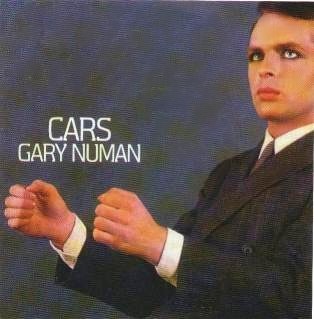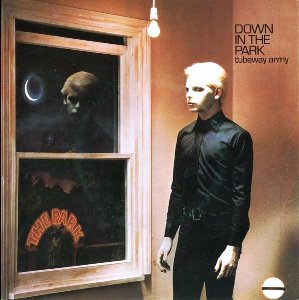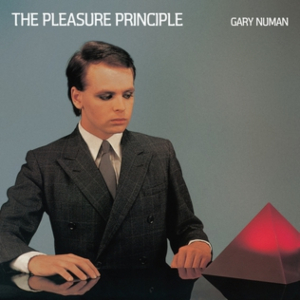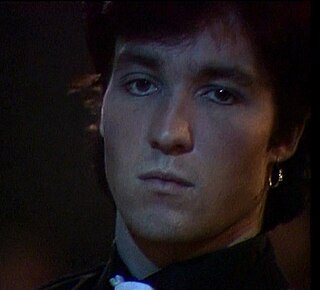
Gary Anthony James Webb, known professionally as Gary Numan, is an English musician. He entered the music industry as frontman of the new wave band Tubeway Army. After releasing two albums with the band, he released his debut solo album The Pleasure Principle in 1979, topping the UK Albums Chart. While his commercial popularity peaked in the late 1970s and early 1980s with hits including "Are 'Friends' Electric?" and "Cars", Numan maintains a cult following. He has sold over 10 million records.

Tubeway Army were a London-based new wave band led by lead singer Gary Numan. Formed at the height of punk rock in 1977 the band gradually changed to an electronic sound. They were the first band of the electronic era to have a synthesiser-based number-one hit, with their single "Are 'Friends' Electric?" and its parent album Replicas both topping the UK charts in mid-1979. After its release, Numan opted to drop the Tubeway Army name and release music under his own name as he was the sole songwriter, producer and public face of the band, but he retained the musicians from Tubeway Army as his backing band.

"Cars" is the debut solo single by English musician Gary Numan. It was released on 21 August 1979 and is from his debut studio album, The Pleasure Principle. The song reached the top of the charts in several countries and was considered one of the first big new wave hits. Today, Numan is considered as an early pioneer of the genre.

"Down in the Park" is a 1979 song by the English band Tubeway Army, featuring lead vocals by Gary Numan. It was released as the first single from the band's second album Replicas, though was not a hit. The song was written and produced by the band's frontman Gary Numan, and despite its lack of commercial success, has been performed by Numan regularly in his live shows throughout the years.

"Are 'Friends' Electric?" is a 1979 song by the English band Tubeway Army. Taken from their album Replicas, it was released as a single in May 1979 and reached number one in the UK Singles Chart, staying there for four weeks. It was written and produced by Gary Numan, the band's frontman and lead vocalist. It was also the band's last single before breaking up.

Dance is the third solo studio album by English musician Gary Numan, released in 1981. It was the first studio album Numan released after his "Farewell Concerts" staged at Wembley Arena.

Replicas is the second and final studio album by English new wave band Tubeway Army, released in April 1979 by Beggars Banquet Records. It followed their self-titled debut from the previous year. After this, Tubeway Army frontman Gary Numan would continue to release records under his own name, though the musicians in Tubeway Army would continue to work with him for some time. Replicas was the first album of what Numan later termed the "machine" phase of his career, preceding The Pleasure Principle and Telekon, a collection linked by common themes of a dystopian science fiction future and transmutation of man/machine, coupled with an androgynous image and a synthetic rock sound.

The Pleasure Principle is the debut solo studio album by English new wave musician Gary Numan, released on 7 September 1979 by Beggars Banquet Records. The album came about six months after Replicas (1979), his second and final studio album with the band Tubeway Army. The Pleasure Principle peaked at No. 1 on the UK Albums Chart.

"I Die: You Die" is a song by the British musician Gary Numan, released as a single in August 1980. Released shortly before his fourth album, Telekon, it continued the anthemic style Numan had begun earlier in the year with "We Are Glass". The composer himself described the two singles as "Much the same thing. Both very chorus-orientated with the guitars as the main rhythmic device and the keyboards tinkling over the top".

"Complex" is a song by British musician Gary Numan. It was the second single to be taken from his 1979 album The Pleasure Principle. The single reached number six in the UK Singles Chart.

Tubeway Army is the debut album by Tubeway Army, released in 1978. Its initial limited-edition run of 5,000 sold out but did not chart. When reissued in mid-1979, following the success of the follow-up Replicas (1979), the more commonly known cover art featuring a stylised portrait of Gary Numan was introduced. This release made No. 14 in the UK album charts.

"That's Too Bad" is the debut single by Tubeway Army, the band which provided the initial musical vehicle for Gary Numan. It was released in February 1978 by independent London record label Beggars Banquet. On the day of its release, Numan quit his job in a warehouse to become a professional musician.

Paul Andrew Gardiner was a British musician who played bass guitar with Gary Numan and Tubeway Army, as well as creating material under his own name.

"Stormtrooper in Drag" is the debut single by Paul Gardiner, who was the bass player in Gary Numan's backing band. Numan is featured on the single as a co-composer, producer, musician and vocalist.

Warriors is the fifth solo studio album by English new wave musician Gary Numan, released on 16 September 1983 by Beggars Banquet Records, it would be his last studio release on that label.

The Plan is an archival compilation album of early demo recordings by British new wave band Tubeway Army, released in 1984.

Living Ornaments '79 (1981) is a live album by British musician Gary Numan recorded at the Hammersmith Odeon on 28 September 1979. It was also released as a limited edition box set with Living Ornaments '80 (1981). An expanded (21-track) version was reissued on a double CD in 1998 before a remastered version was again reissued in 2005. The nine tracks of the original Living Ornaments '79 were included on 1979: The Live EPs, a disc available to those who bought the expanded, 2-disc version of The Pleasure Principle from Numan's website in 2009.

Living Ornaments '80 is a live album by British musician Gary Numan, first released in 1981. It was also issued as a limited edition box set with Living Ornaments '79 the same year. The original release was recorded at the Hammersmith Odeon on 16 September 1980, as a record of Numan's "Teletour".

The following is a comprehensive discography of Gary Numan, a British singer and musician. Numan released his first record in 1978 as part of the outfit Tubeway Army. Initially unsuccessful, the band scored a huge hit in 1979 with the single "Are Friends Electric" and their second album Replicas, both of which reached number one in the UK. Numan then decided to release further recordings under his own name, beginning with the single "Cars" later in 1979. Both this and the subsequent album The Pleasure Principle also reached number one in the UK, and Numan became a leading force in the British electronic music scene. He scored a third number one album in 1980 with Telekon, and more hit singles and albums until the mid 1980s when his popularity waned. Despite this, he has continued to record and tour on a regular basis up to the present day. His 2017 studio album, Savage , entered the UK Albums Chart at no. 2, which was Numan's highest chart peak since 1980. His most recent album, 2021's Intruder, also entered the UK charts at no. 2.

Rikki and the Last Days of Earth were an early British punk group. They were chronicled in Henrik Poulsen's book 77: The Year of Punk and New Wave. Billboard credited them with paving the way for 1980s new romantic acts.



















